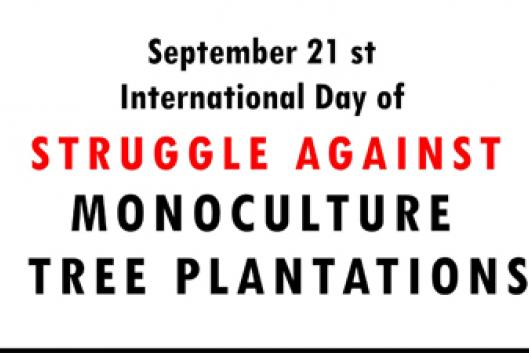What is the sense of another International Day of Struggle Against Monoculture Tree Plantations, which will take place this coming September 21? Some might ask why such a day is celebrated, since these plantations continue to grow and expand around the world. Is there really any way to stop the expansion of industrial plantations of oil palm, pine, acacia, eucalyptus and rubber trees?
It is true that there are no magic formulas for halting the advance of these plantations. In places where local communities have succeeded in stopping or resisting the advance of tree plantations, or have even managed to recover their territories, a mix of tools have been used, depending on each individual situation and context. Nevertheless, in all of the stories that have led to small or big victories, there are frequently certain actions, certain key activities, such as mobilizing, uniting and organizing, which in combination have contributed to the real strengthening of popular pressure on governments and companies in contexts that are generally highly unequal. If there is in fact a “magic formula”, it certainly contains some basic “ingredients”.
It is in this sense that a specific day of action is another of these very important “ingredients”, aimed at strengthening popular struggles and their power to exert effective pressure. It is a legitimate proposal, because it was born at a meeting of roughly 200 people from communities fighting industrial eucalyptus plantations in Brazil in 2004. This proposal became an international day of action through the important contribution of our colleague and friend Ricardo Carrere. And although he is no longer with us, Ricardo continues to inspire us with the enthusiasm and passion with which he always supported these struggles against industrial tree plantations.
When they proposed a specific day of action, the communities gathered at the meeting were seeking ways to strengthen their resistance struggles, to give them greater visibility. They believed it was also important to have a day to celebrate the successful recoveries of territories, which must always be remembered, because they resulted from struggles waged with great sacrifice. These are communities fighting for their territories and against the green desert, working together, with a small number of allies, but who are often practically alone in their struggles and are persecuted and criminalized by a group made up of the police, the companies, governments, the media, and other actors. They are always accused of being opposed to development and “progress” – a “progress” that leads to more exclusion, more violence and more injustice.
It is therefore well worth having a day on which to draw attention to these struggles and the people involved; to show that, in fact, this is a struggle being waged by communities and their allies in different countries and continents, a struggle for territory, for dignity, for rights. In addition, September 21 is aimed, above all, at fostering solidarity between these struggles. An example of this are the actions that WRM will be carrying out this month to support concrete struggles in different countries and continents, through letters and other shows of support.
These struggles have enormous value: they seek to defend territories, food sovereignty, forest conservation, natural medicine, and the traditional values, customs and economies of a community, in all their richness. It is on the basis of these struggles that we believe it is possible to construct another world, as long as they have greater visibility and are strengthened by being increasingly interconnected and united.
For a community, knowing more about the struggle of other communities can help it to learn more about its own reality, to reflect on the tools that can be used to confront and combat threats like industrial monoculture plantations, and above all, it can serve as an inspiration and an example, a new source of encouragement. It is extremely important to share information and experiences with communities that are beginning to confront companies that seek to enter their territories. It is in this spirit that we have prepared this bulletin dedicated to September 21.
We hope that the joint coordination of this International Day Against Monoculture Tree Plantations leads to increasingly broad and permanent joint coordination; that the knowledge that the same struggles are being waged in other places serves as new motivation for communities to pursue the sharing of experiences and thereby strengthen mutual support and solidarity.
